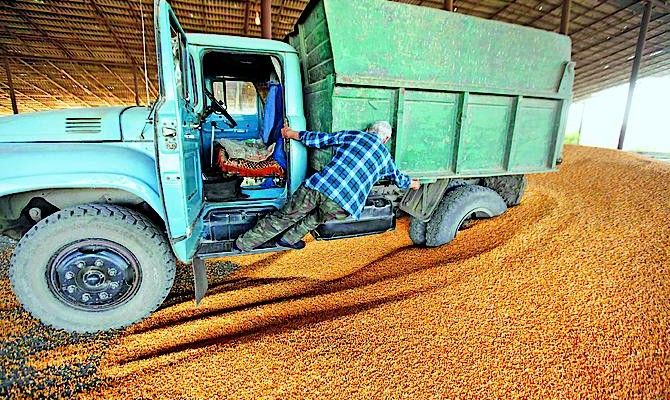Business
food securityAgrarians promise to sell all their grain now due to the red tape

Bureaucrats are threatening the security of supply of foodstuffs in the country. The Ukrainian Club of Agrarian Business association (UCAB) is demanding officials to eliminate the shortage of storehouse document forms for grain. The corresponding letters were sent to Premier Arseniy Yatsenyuk, Minister of Agrarian Policy and Foodstuffs Ihor Shvaika and Director of the State Registry of Ukraine, which prints these letterheads Andriy Babchenko. “Today, the majority of grain warehouses (silos) cannot buy warehouse documents for grain due to their shortage in the State Registry of Ukraine,” says General Director of UCAB Volodymyr Lapa. Agrarians confirm this information. “Submitting grain for storage is quite problematic at the moment as the dual warehouse documents for grain are not issued,” the head of a logistics department of a large agro company, who requested anonymity, confirmed.
Pursuant to the law “On Grain and the Grain Market of Ukraine”, the elevator must issue a document confirming acceptance of delivered grain. This is a warehouse receipt and a simple or dual certificate. Noteworthy is that agrarians use a dual certificate for grain in order to receive loans from banks.
They forgot to order
The shortage of documents started in September and as harvesting progressed it became more acute. The owners of grain elevators cannot issue documents of confirmation to farmers, which is the reason they are not accepting grain for storage. The State Registry of Ukraine could not explain the reason for the shortage of these document forms. “This is not within my obligations. Appeal to my director,” a representative of a specialized department, who refused to give his name, told Capital. Babchenko’s secretary said he was at a meeting in the Ministry of Agrarian Policy and Foodstuffs. When the publication was sent to print the director was still in a meeting.
Agrarians say the shortage of these warehouse forms is due to the vindictiveness and negligence of officials. “The main reason is the reorganization of central bodies of power and the raised status of state enterprises that conduct the registers,” Lapa assures. The general director of UCAB sees a hidden motive in the actions of officials. “If you managed to cancel the certification of storehouses, then we will not issue warehouse document forms”.
As Capital wrote earlier, in September the government did away with the State Inspection of Agriculture and prior to that in April it cancelled the compulsory certification of grain elevators. This is exactly what the inspection was mainly engaged in. According to information of the International Finance Corporation, earlier certificates for grain and grain warehouses cost agrarians no less than UAH 160 mn per year. Besides that, according to estimates of UCAB, the certification procedure often presupposes payment of additional unaccounted for fees from UAH 20-40 per ton of grain.
“It is quite possible that the State Registry of Ukraine, which is subordinated to the Ministry of Agrarian Policy, simply did not file an order for the printing of these forms,” General Director of the Ukrainian Grain Association Volodymyr Klymenko presumes. Perhaps this is because printing houses were overloaded with orders to print election ballots. “It is totally possible that the ruling authority failed to set priorities,” says a senior manager of one agricultural company, who requested anonymity.
Capital asked the Ministry of Agrarian Policy and Foodstuffs, to which the State Registry of Ukraine and earlier to the State Agricultural Inspection Bureau are subordinated, to comment on the accusations that agrarians made, but the publication never received an official reply.
Loans to agrarians are inaccessible
The hike in interest rates on bank loans has forced agrarians to seek alternative methods of attracting money for the development of their businesses. According to statistics of the Ministry of Agrarian Policy, over 10 months of 2014 the volume of loans to agrarians decreased by one third to UAH 8.9 bn. Furthermore, the average interest rate on loans is 22-25% per annum in the national currency, which is 3-5% higher than last year’s indicator.
The problem with forms only aggravated the situation. “Without the possibility of being issued a document form for a simple or dual storage certificate, agrarians cannot receive loans… The lack of funds for the next sowing or harvest season leaves farmers with no alternative but to sell their grain. As a consequence, the issue of the availability of grain for the needs of the domestic market could arise in the second half of the fiscal year (January-June),” Lapa predicts.
In July-October 2014, 11.53 mn t of grain were exported, which is 26% more than in the same period last year. Furthermore, the prices of grain in autumn are traditionally lower than in the spring.
As a reminder, grain that is stored in the reserve fund satisfies the minimum needs of the domestic market. Klymenko is convinced that if the “paperwork problem” is resolved in the near future, the guarantee of supply of foodstuffs should not be under threat.






 of the agreement of syndication with Financial Times Limited are strictly prohibited. Use of materials which refers to France-Presse, Reuters, Interfax-Ukraine, Ukrainian News, UNIAN agencies is strictly prohibited. Materials marked
of the agreement of syndication with Financial Times Limited are strictly prohibited. Use of materials which refers to France-Presse, Reuters, Interfax-Ukraine, Ukrainian News, UNIAN agencies is strictly prohibited. Materials marked  are published as advertisements.
are published as advertisements.